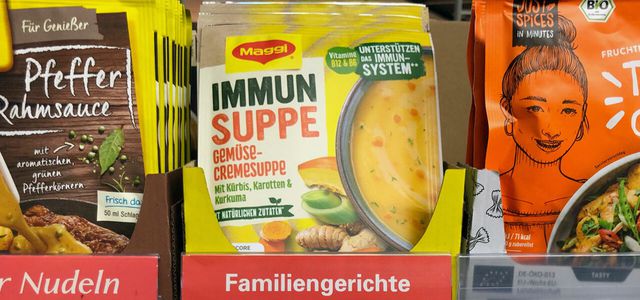
Time for an Immune Boost? Then we recommend foods other than ready-made products such as Maggi’s Immune Soup.
The labels on the packet soups sound promising. The writing “Immun-Soup” immediately catches the eye. In addition, the pack advertises with vitamin B12, which is supposed to support the immune system, and with “natural ingredients”. Maggi offers three varieties:
- “Chicken noodle soup with carrots, turmeric and ginger”
- “Vegetable cream soup with pumpkin, carrots and turmeric”
- “Cauliflower broccoli with turmeric, spinach and broccoli florets”
The vegetables and spices suggest that they are natural and healthy soups.
What’s in Maggi’s “immune soups?”

What is actually in a packet of soup? As you would expect, not too many vegetables. Maggi thinks the almost nine percent is apparently enough to advertise with it. For a powder poured with water to taste good, it needs salt, sugar, milk protein and flavorings. Starch and wheat flour are the main ingredients of the soup. These, too, are not known for their variety of vitamins and minerals. Then what can be the immune booster in the soup? A little bit of added vitamins B6 and B12? Oh well.
Strong immune system thanks to vitamin B12?
Nevertheless, we have to take a closer look at vitamin B12. Because Maggi is only allowed to print the explanatory statement of the immune soup “contributes to a normal function of the immune system” on the packaging if the soup also contains sufficient usable vitamin B12. With the “immune soups” from Maggi, this sentence is written in small letters on the front at the bottom of the pack. The bold print “supports the immune system”, on the other hand, is the first thing that catches the eye and sounds much stronger than the legally permitted formulation. The whole thing is only topped by the eponymous immune soup.
In any case, most people in Germany are adequately supplied with vitamin B12 through their diet. Since the vitamin is only found in relevant quantities in animal products, there is a risk of vitamin B12 deficiency, especially in vegans. However, they cannot do anything with Maggi’s “immune soups” because they are not vegan. In any case, we do not advise you to think your own immune system too dependent on immune soups from the bag.
Further arguments against Maggi’s “immune soups”

Apart from the health aspects, there are other reasons why the “immune soups” from Maggi are not recommended:
- The small bags cause a lot of packaging waste.
- The current price of the “immune soup” at Rewe, for example, is 1.19 euros. In the case of the “immune soups”, you get two plates of 60 to 70 calories each. You can cook much more nutritious dishes for a similar amount of money from cheap and healthy winter vegetables such as pumpkin or carrots.
- The soups are not certified organic. This is particularly critical with animal products, since conventional animal husbandry only sets low standards for animal welfare. Here you can find out more about why organic labels are important for animal products: Bio-Siegel in comparison: What do animals get from organic animal husbandry? In the case of herbal products, too, those with the organic seal are preferable – among other things, because in the organic farming no synthetic chemical pesticides are allowed.
- Maggi is part of Nestlé. The large corporation is repeatedly criticized for various reasons.
A few articles on Nestlé’s practices:
- Video tip: 5 lousy stitches from Nestlé
- Nestlé pumps water out of California without permission – despite the drought
- Internal document: Nestlé rates over half of its products as unhealthy
- Nestlé is in trouble again over baby milk
Healthy and tasty alternatives to Maggi’s “immune soups”
So there are many reasons to leave Maggi’s “immune soups” on the supermarket shelves and cook them yourself instead. Even in winter there are a few fresh vegetables and various Tubers and roots from storage. Many delicious dishes can be prepared from this, for example:
- Winter recipes: seasonal dishes that keep you warm
- 3 healthy winter smoothies that will keep you warm
- Seasonal spreads: 3 recipes with regional winter vegetables
- Winter salad: recipes with ingredients from the season
- Pea stew: easy recipe for fall and winter
- Kale Salad: A vitamin-rich salad for the winter
- Pumpkin recipes: 4 delicious ideas for autumn
- Beetroot soup: basic recipe and delicious variations
- Prepare kale: this is how it tastes guaranteed
Check out another article for more useful tips: More than cabbage and beets: eat right regionally in winter
Read more on Techzle.com:
- Nestlé brands: These products belong to the company
- Preventing a cold: this is how you stay healthy
- Convenience Food: These are better alternatives